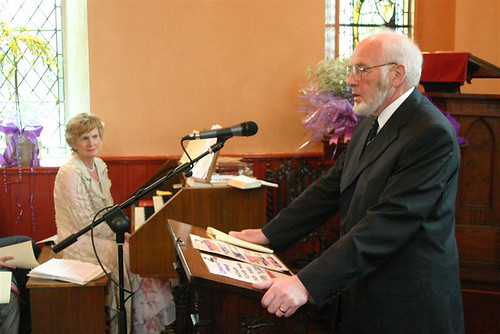Mischa Fekete - the gentle giant of Bridge Camphill
 |
| Mischa prior to the completion of the Nature Trail. |
When Mischa Fekete first came in 1992 to what could be the Bridge Camphill Community home, it was just an empty field, writes Brian Byrne. Two decades later the former Nugent's Field had houses for the co-workers and those they cared for. Also a weavery. A community hall. An organic produce store. A coffee shop and resource centre. And lots of small farm animals — chickens, geese, pigs, turkeys, all part of an almost self-sufficient operation that become an important part of the heart of Kilcullen.
 |
| At the launch of Brendan Reid's book with the author, along with Pauline Fagan and John Martin. |
The core of his interest was to help the people for whom Camphill was established, especially those in the Bridge community, achieve their potential and their ambitions. One example, in 2010 he helped publish Living Communities - A Biography Of Sorts, written by Bridge Community member Brendan Reid. The same year he and the community had helped make come true the dream of an autistic resident, Colm, to spend six weeks in New York.
 |
| At the Difference Day in 2012 with Margaret O'Shea, Gabrielle Berney, John Martin, and Terri O'Sullivan. |
In 2011, the Bridge Community was building a Nature Trail for the people of Kilcullen to enjoy. The project was completed the following year with the help of 250 volunteers, some 220 of whom were employees from financial services company Liberty Investments taking part in a voluntary Difference Day at the site. Officially opened on 28 August 2012, the trail was hailed by locals as 'a gift to the community'.
As part of his leadership role in Bridge Camphill, Mischa promoted the community's involvement in the Patrick's Day parades of 2013 and 2014, where their St Patrick and the Snake was a popular component and won the Best Float Award in 2013. He was also the person-in-charge of the Bridge Community when they passed with flying colours their first inspection by the Health Information and Quality Authority (HIQA) in 2016.
 |
| With Kevin Prendergast when accepting his Community Award in 2015. |
The community celebrated their 25th anniversary in August 2017, and as director he thanked the people of Kilcullen for welcoming the group all those years ago. Two years before that, the 2015 presentation to Mischa of a Kilcullen Community Award had been a recognition for someone who had made 'a huge contribution' to Kilcullen over the previous two decades and more. Apart from his Camphill work, which had helped break down barriers between those with special needs and the other residents of Kilcullen, Mischa had been involved with many other aspects of the town and was 'a man of many talents and always willing to share those talents', as the Community Award citation noted.
 |
| Working on the set of A Christmas Carol. |
A whiz with a computer, Mischa set up a blog in 2007 for the two Camphill communities at Dunshane and Kilcullen. His skills were also used by Kilcullen Drama Group in the design of highly-professional posters for their productions, such as that for A Life in 2009. Even though not well recently, he produced a brilliant poster for the November 2024 presentation of Calendar Girls.
Mischa's participation in Kilcullen life also included membership of Kilcullen Community Action, for which he served as treasurer in the mid-'naughties'. In 2012 he was an active member of the Steering Group developing the Kilcullen participation in the national Gathering 2013 initiative.
Photographs use Policy — Privacy Policy





















.jpg)


























